EC
-
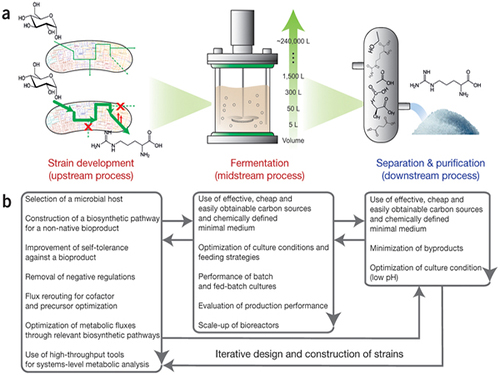 Establishment of System Metabolic Engineering Strategies
Although conventional petrochemical processes have generated chemicals and materials which have been useful to mankind, they have also triggered a variety of environmental problems including climate change and relied too much on nonrenewable natural resources. To ameliorate this, researchers have actively pursued the development of industrial microbial strains around the globe in order to overproduce industrially useful chemicals and materials from microbes using renewable biomass. This discipline is called metabolic engineering.
Thanks to advances in genetic engineering and our knowledge of cellular metabolism, conventional metabolic engineering efforts have succeeded to a certain extent in developing microbial strains that overproduce bioproducts at an industrial level. However, many metabolic engineering projects launched in academic labs do not reach commercial markets due to a failure to fully integrate industrial bioprocesses.
In response to this, Distinguished Professor Sang Yup Lee and Dr. Hyun Uk Kim, both from the Department of Chemical and Biomolecular Engineering at KAIST, have recently suggested ten general strategies of systems metabolic engineering to successfully develop industrial microbial strains. Systems metabolic engineering differs from conventional metabolic engineering by incorporating traditional metabolic engineering approaches along with tools of other fields, such as systems biology, synthetic biology, and molecular evolution.
The ten strategies of systems metabolic engineering have been featured in Nature Biotechnology released online in October 2015, which is entitled "Systems strategies for developing industrial microbial strains."
The strategies cover economic, state-of-the-art biological techniques and traditional bioprocess aspects. Specifically, they consist of: 1) project design including economic evaluation of a target bioproduct; 2) selection of host strains to be used for overproduction of a bioproduct; 3) metabolic pathway reconstruction for bioproducts that are not naturally produced in the selected host strains; 4) increasing tolerance of a host strain against the bioproduct; 5) removing negative regulatory circuits in the microbial host limiting overproduction of a bioproduct; 6) rerouting intracellular fluxes to optimize cofactor and precursor availability necessary for the bioproduct formation; 7) diagnosing and optimizing metabolic fluxes towards product formation; 8) diagnosis and optimization of microbial culture conditions including carbon sources; 9) system-wide gene manipulation to further increase the host strain's production performance using high-throughput genome-scale engineering and computational tools; and 10) scale-up fermentation of the developed strain and diagnosis for the reproducibility of the strain's production performance.
These ten strategies were articulated with successful examples of the production of L-arginine using Corynebacterium glutamicum, 1,4-butanediol using Escherichia coli, and L-lysine and bio-nylon using C. glutamicum.
Professor Sang Yup Lee said, "At the moment, the chance of commercializing microbial strains developed in academic labs is very low. The strategies of systems metabolic engineering outlined in this analysis can serve as guidelines when developing industrial microbial strains. We hope that these strategies contribute to improving opportunities to commercialize microbial strains developed in academic labs with drastically reduced costs and efforts, and that a large fraction of petroleum-based processes will be replaced with sustainable bioprocesses."
Lee S. Y. & Kim, H. U. Systems Strategies for Developing Industrial Microbial Strains. Nature Biotechnology (2015).
This work was supported by the Technology Development Program to Solve Climate Change on Systems Metabolic Engineering for Biorefineries (NRF-2012M1A2A2026556) and by the Intelligent Synthetic Biology Center through the Global Frontier Project (2011-0031963) from the Ministry of Science, ICT and Future Planning (MSIP), Korea, and through the National Research Foundation (NRF) of Korea. This work was also supported by the Novo Nordisk Foundation.
Picture: Concept of the Systems Metabolic Engineering Framework
(a) Three major bioprocess stages (b) Considerations in systems metabolic engineering to optimize the whole bioprocess. List of considerations for the strain development and fermentation contribute to improving microbial strain's production performance (red), whereas those for the separation and purification help in reducing overall operation costs by facilitating the downstream process (blue). Some of the considerations can be repeated in the course of systems metabolic engineering.
2015.10.19 View 11128
Establishment of System Metabolic Engineering Strategies
Although conventional petrochemical processes have generated chemicals and materials which have been useful to mankind, they have also triggered a variety of environmental problems including climate change and relied too much on nonrenewable natural resources. To ameliorate this, researchers have actively pursued the development of industrial microbial strains around the globe in order to overproduce industrially useful chemicals and materials from microbes using renewable biomass. This discipline is called metabolic engineering.
Thanks to advances in genetic engineering and our knowledge of cellular metabolism, conventional metabolic engineering efforts have succeeded to a certain extent in developing microbial strains that overproduce bioproducts at an industrial level. However, many metabolic engineering projects launched in academic labs do not reach commercial markets due to a failure to fully integrate industrial bioprocesses.
In response to this, Distinguished Professor Sang Yup Lee and Dr. Hyun Uk Kim, both from the Department of Chemical and Biomolecular Engineering at KAIST, have recently suggested ten general strategies of systems metabolic engineering to successfully develop industrial microbial strains. Systems metabolic engineering differs from conventional metabolic engineering by incorporating traditional metabolic engineering approaches along with tools of other fields, such as systems biology, synthetic biology, and molecular evolution.
The ten strategies of systems metabolic engineering have been featured in Nature Biotechnology released online in October 2015, which is entitled "Systems strategies for developing industrial microbial strains."
The strategies cover economic, state-of-the-art biological techniques and traditional bioprocess aspects. Specifically, they consist of: 1) project design including economic evaluation of a target bioproduct; 2) selection of host strains to be used for overproduction of a bioproduct; 3) metabolic pathway reconstruction for bioproducts that are not naturally produced in the selected host strains; 4) increasing tolerance of a host strain against the bioproduct; 5) removing negative regulatory circuits in the microbial host limiting overproduction of a bioproduct; 6) rerouting intracellular fluxes to optimize cofactor and precursor availability necessary for the bioproduct formation; 7) diagnosing and optimizing metabolic fluxes towards product formation; 8) diagnosis and optimization of microbial culture conditions including carbon sources; 9) system-wide gene manipulation to further increase the host strain's production performance using high-throughput genome-scale engineering and computational tools; and 10) scale-up fermentation of the developed strain and diagnosis for the reproducibility of the strain's production performance.
These ten strategies were articulated with successful examples of the production of L-arginine using Corynebacterium glutamicum, 1,4-butanediol using Escherichia coli, and L-lysine and bio-nylon using C. glutamicum.
Professor Sang Yup Lee said, "At the moment, the chance of commercializing microbial strains developed in academic labs is very low. The strategies of systems metabolic engineering outlined in this analysis can serve as guidelines when developing industrial microbial strains. We hope that these strategies contribute to improving opportunities to commercialize microbial strains developed in academic labs with drastically reduced costs and efforts, and that a large fraction of petroleum-based processes will be replaced with sustainable bioprocesses."
Lee S. Y. & Kim, H. U. Systems Strategies for Developing Industrial Microbial Strains. Nature Biotechnology (2015).
This work was supported by the Technology Development Program to Solve Climate Change on Systems Metabolic Engineering for Biorefineries (NRF-2012M1A2A2026556) and by the Intelligent Synthetic Biology Center through the Global Frontier Project (2011-0031963) from the Ministry of Science, ICT and Future Planning (MSIP), Korea, and through the National Research Foundation (NRF) of Korea. This work was also supported by the Novo Nordisk Foundation.
Picture: Concept of the Systems Metabolic Engineering Framework
(a) Three major bioprocess stages (b) Considerations in systems metabolic engineering to optimize the whole bioprocess. List of considerations for the strain development and fermentation contribute to improving microbial strain's production performance (red), whereas those for the separation and purification help in reducing overall operation costs by facilitating the downstream process (blue). Some of the considerations can be repeated in the course of systems metabolic engineering.
2015.10.19 View 11128 -
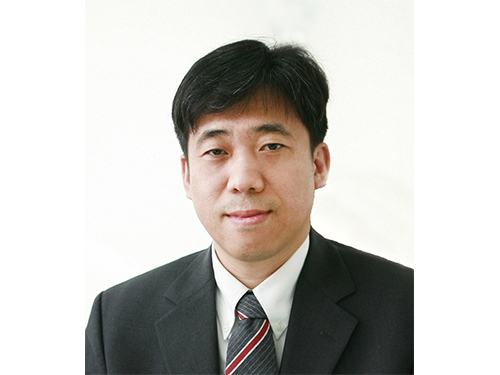 Professor Ki-Jun Jeong Wins the 2015 Dam Yeun Academic Award
The 11th Dam Yeun Academic Award presented by the Korean Society for Biotechnology and Bioengineering (KSBB) to a biologist under 45 years old went to Professor Ki-Jun Jeong of the Chemical and Biomolecular Engineering Department at KAIST.
The award ceremony took place on October 13, 2015, at the annual conference of KSBB held at Songdo Convensia in Incheon City.
Each year KSBB announces the recipient of the award based on the publications by researchers in the last five years at peer-reviewed international journals or KSBB Journal as well as the record of patent registration and technology transfers.
Professor Jeong is recognized for his pioneering research in protein, antibody, cellular engineering, and protein displays and chips.
2015.10.19 View 9531
Professor Ki-Jun Jeong Wins the 2015 Dam Yeun Academic Award
The 11th Dam Yeun Academic Award presented by the Korean Society for Biotechnology and Bioengineering (KSBB) to a biologist under 45 years old went to Professor Ki-Jun Jeong of the Chemical and Biomolecular Engineering Department at KAIST.
The award ceremony took place on October 13, 2015, at the annual conference of KSBB held at Songdo Convensia in Incheon City.
Each year KSBB announces the recipient of the award based on the publications by researchers in the last five years at peer-reviewed international journals or KSBB Journal as well as the record of patent registration and technology transfers.
Professor Jeong is recognized for his pioneering research in protein, antibody, cellular engineering, and protein displays and chips.
2015.10.19 View 9531 -
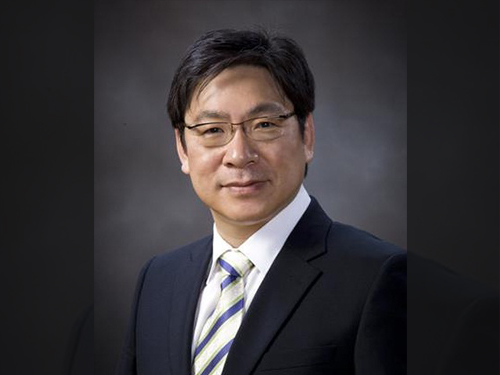 Professor Key-Sun Choi Receives the Order of Service Merit Green Stripes from the Korean Government
The award recognizes Professor Choi’s life-long research effort to make Korean language digitally available, both nationally and internationally.
Professor Key-Sun Choi of the School of Computing at KAIST received the Order of Service Merit Green Stripes from the Korean government at the 569th Korean Language Day, held annually to commemorate the invention of the Korean language, Hangeul. The ceremony took place on October 9, 2015, at the Sejong Center in Seoul.
Professor Choi has distinguished himself in the field of natural language processing (NLP), including Korean language. He developed a Korean NLP parser that enabled information processing and data analysis of Korean language, as well as a digital Korean dictionary, contributing to the advancement of Korean language-based information technology.
Professor Choi also led the way to widespread use of Korean natural language in computing by developing and commercializing open source software to process the Korean language.
He has served leading roles in many of the international academic societies and standardization organizations, among others, as the vice president of Infoterm (the International Information Center for Terminology), president of the Asia Federation of Natural Language Processing, vice chair of ISO/TC 37, a technical committee in the International Organization for Standardization (ISO), and a council member for the International Association of Machine Translation.
2015.10.08 View 9099
Professor Key-Sun Choi Receives the Order of Service Merit Green Stripes from the Korean Government
The award recognizes Professor Choi’s life-long research effort to make Korean language digitally available, both nationally and internationally.
Professor Key-Sun Choi of the School of Computing at KAIST received the Order of Service Merit Green Stripes from the Korean government at the 569th Korean Language Day, held annually to commemorate the invention of the Korean language, Hangeul. The ceremony took place on October 9, 2015, at the Sejong Center in Seoul.
Professor Choi has distinguished himself in the field of natural language processing (NLP), including Korean language. He developed a Korean NLP parser that enabled information processing and data analysis of Korean language, as well as a digital Korean dictionary, contributing to the advancement of Korean language-based information technology.
Professor Choi also led the way to widespread use of Korean natural language in computing by developing and commercializing open source software to process the Korean language.
He has served leading roles in many of the international academic societies and standardization organizations, among others, as the vice president of Infoterm (the International Information Center for Terminology), president of the Asia Federation of Natural Language Processing, vice chair of ISO/TC 37, a technical committee in the International Organization for Standardization (ISO), and a council member for the International Association of Machine Translation.
2015.10.08 View 9099 -
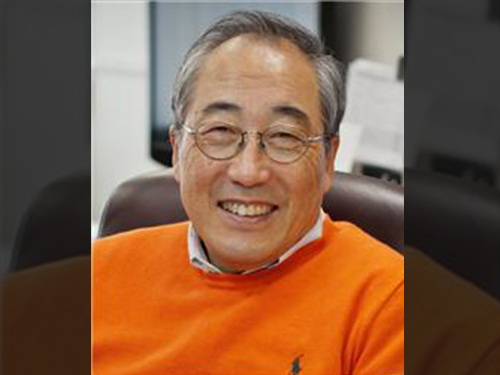 Yang-Hann Kim named recipient of the Rossing Prize in Acoustics Education by the Acoustical Society of America
Courtesy of the Acoustical Society of America (ASA)
Press release issued by ASA on October 8, 2015:
Yang-Hann Kim named recipient of the Rossing Prize in Acoustics Education by the Acoustical Society of America
Melville (NY), 8 October 2015—Yang-Hann Kim, Professor at KAIST (Korea Advanced Institute of Science and Technology), Daejeon, has been named recipient of the Acoustical Society of America (ASA) Rossing Prize in Acoustics Education. The Rossing Prize is awarded to an individual who has made significant contributions toward furthering acoustics education through distinguished teaching, creation of educational materials, textbook writing and other activities. The Prize will be presented at the 170th meeting of the ASA on 4 November 2015 in Jacksonville, Florida.
“It is my great honor to receive the Rossing Prize, which has been given to outstanding scholar members of ASA since 2003. I never dreamed to be one of them.” said Kim. “I must express my deep respect and love to my friend Thomas Rossing: I have known him more than 20 years, always respect what he has done for teaching, writing books, and pioneering work in musical acoustics.”
Yang-Hann Kim is a Fellow of the Acoustical Society of America. He received a Ph.D. from the Massachusetts Institute of Technology. His main research interests in acoustics began with “sound visualization” resulted in the development of the “sound camera” which makes any sound visible instantly. Then he moved to “sound manipulation.” Using his manipulation technology, one can move any sound in space and time, positioning sound, and can create a private sound zone. Sound Visualization and Manipulation, (Wiley, 2013), summarizes these two fields. Dr. Kim’s textbook, Sound Propagation: An Impedance Based Approach (John Wiley and Sons, 2010), is well acknowledged by the associated professional communities as one of best acoustics textbooks. Using his teaching experience at KAIST, he created a YouTube lecture on acoustics and vibration which is also available in MOOC (Massive Open Online Course). He has also presented lectures to over 500 engineers and technicians for the past 30 years.
###
The Acoustical Society of America (ASA) is the premier international scientific society in acoustics devoted to the science and technology of sound. Its 7000 members worldwide represent a broad spectrum of the study of acoustics. ASA publications include the Journal of the Acoustical Society of America—the world’s leading journal on acoustics, Acoustics Today magazine, books, and standards on acoustics. The Society also holds two major scientific meetings per year. For more information about the Society visit our website, www.acousticalsociety.org.
2015.10.06 View 9844
Yang-Hann Kim named recipient of the Rossing Prize in Acoustics Education by the Acoustical Society of America
Courtesy of the Acoustical Society of America (ASA)
Press release issued by ASA on October 8, 2015:
Yang-Hann Kim named recipient of the Rossing Prize in Acoustics Education by the Acoustical Society of America
Melville (NY), 8 October 2015—Yang-Hann Kim, Professor at KAIST (Korea Advanced Institute of Science and Technology), Daejeon, has been named recipient of the Acoustical Society of America (ASA) Rossing Prize in Acoustics Education. The Rossing Prize is awarded to an individual who has made significant contributions toward furthering acoustics education through distinguished teaching, creation of educational materials, textbook writing and other activities. The Prize will be presented at the 170th meeting of the ASA on 4 November 2015 in Jacksonville, Florida.
“It is my great honor to receive the Rossing Prize, which has been given to outstanding scholar members of ASA since 2003. I never dreamed to be one of them.” said Kim. “I must express my deep respect and love to my friend Thomas Rossing: I have known him more than 20 years, always respect what he has done for teaching, writing books, and pioneering work in musical acoustics.”
Yang-Hann Kim is a Fellow of the Acoustical Society of America. He received a Ph.D. from the Massachusetts Institute of Technology. His main research interests in acoustics began with “sound visualization” resulted in the development of the “sound camera” which makes any sound visible instantly. Then he moved to “sound manipulation.” Using his manipulation technology, one can move any sound in space and time, positioning sound, and can create a private sound zone. Sound Visualization and Manipulation, (Wiley, 2013), summarizes these two fields. Dr. Kim’s textbook, Sound Propagation: An Impedance Based Approach (John Wiley and Sons, 2010), is well acknowledged by the associated professional communities as one of best acoustics textbooks. Using his teaching experience at KAIST, he created a YouTube lecture on acoustics and vibration which is also available in MOOC (Massive Open Online Course). He has also presented lectures to over 500 engineers and technicians for the past 30 years.
###
The Acoustical Society of America (ASA) is the premier international scientific society in acoustics devoted to the science and technology of sound. Its 7000 members worldwide represent a broad spectrum of the study of acoustics. ASA publications include the Journal of the Acoustical Society of America—the world’s leading journal on acoustics, Acoustics Today magazine, books, and standards on acoustics. The Society also holds two major scientific meetings per year. For more information about the Society visit our website, www.acousticalsociety.org.
2015.10.06 View 9844 -
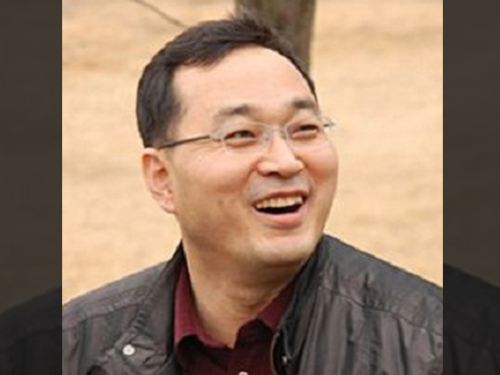 Professor Junehwa Song Appointed as the General Chair of the Organizing Committee of ACM SenSys
Professor Junehwa Song from the Schooling of Computing at KAIST has been appointed the general chair of the organizing committee of ACM SenSys—the American Computing Machine (ACM) Conference on Embedded Networked Sensor Systems.
ACM SenSys held its first conference in 2003 to promote research on wireless sensor networks and embedded systems. Since then, it has expanded into an influential international conference especially with the increasing importance in sensor technologies. Recently the committee has expanded its field of interest to mobile sensors, the Internet of Things, smart device system, and security.
Professor Song is considered a world-renown researcher in mobile and ubiquitous computing system. He presented numerous research papers at various conferences organized by ACM. He is also a member of the editorial committee of the Institute of Electrical and Electronics Engineers (IEEE) Transactions on Mobile Computing journal. For his achievements in the field and flair for coordinating and planning conferences, he is now the first Korean researcher to be appointed the chair of ACM SenSys.
Professor Song said that, as the chair, he would help discover new technology in and applications of networked, wireless sensors that would meet the demands of our modern society.
The 13th ACM SenSys will take place in Seoul—the first one to be held in Asia. The event will begin on November 1, 2015 and last four days. More information about this year’s event can be found at http://sensys.acm.org/2015/.
2015.10.02 View 7919
Professor Junehwa Song Appointed as the General Chair of the Organizing Committee of ACM SenSys
Professor Junehwa Song from the Schooling of Computing at KAIST has been appointed the general chair of the organizing committee of ACM SenSys—the American Computing Machine (ACM) Conference on Embedded Networked Sensor Systems.
ACM SenSys held its first conference in 2003 to promote research on wireless sensor networks and embedded systems. Since then, it has expanded into an influential international conference especially with the increasing importance in sensor technologies. Recently the committee has expanded its field of interest to mobile sensors, the Internet of Things, smart device system, and security.
Professor Song is considered a world-renown researcher in mobile and ubiquitous computing system. He presented numerous research papers at various conferences organized by ACM. He is also a member of the editorial committee of the Institute of Electrical and Electronics Engineers (IEEE) Transactions on Mobile Computing journal. For his achievements in the field and flair for coordinating and planning conferences, he is now the first Korean researcher to be appointed the chair of ACM SenSys.
Professor Song said that, as the chair, he would help discover new technology in and applications of networked, wireless sensors that would meet the demands of our modern society.
The 13th ACM SenSys will take place in Seoul—the first one to be held in Asia. The event will begin on November 1, 2015 and last four days. More information about this year’s event can be found at http://sensys.acm.org/2015/.
2015.10.02 View 7919 -
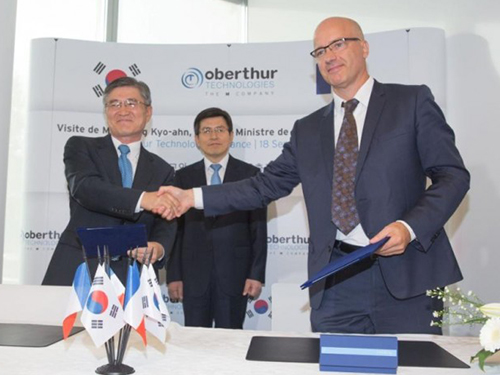 KAIST and Oberthur Technologies Agree for Research and Development in Mobile Security
Professor Kwangjo Kim of the School of Computing at KAIST has signed a research and development (R&D) agreement with Marc Bertin, the Chief Technology Officer of Oberthur Technologies (OT), a French security solutions firm, on September 18, 2015 in Paris.
Under the agreement, KAIST and OT will conduct joint research on mobile security as well as implement an internship program for KAIST graduate students to work either at OT’s R&D center in Korea or in France.
OT has established a research center in Korea in July 2014, which was the fourth of its research centers in Asia.
Professor Kim said, “Our goal at KAIST is to cultivate top-level security experts in security technologies. By partnering with such a leader in security technologies as OT, we know that we will both help shape tomorrow’s security solution for the IoT (Internet of Things) space.”
In the picture, Professor Kwangjo Kim (left) shakes hands with Marc Bertin, the Chief Technology Officer of Oberthur Technologies (right), after the signing of a memorandum of understanding.
2015.09.24 View 7875
KAIST and Oberthur Technologies Agree for Research and Development in Mobile Security
Professor Kwangjo Kim of the School of Computing at KAIST has signed a research and development (R&D) agreement with Marc Bertin, the Chief Technology Officer of Oberthur Technologies (OT), a French security solutions firm, on September 18, 2015 in Paris.
Under the agreement, KAIST and OT will conduct joint research on mobile security as well as implement an internship program for KAIST graduate students to work either at OT’s R&D center in Korea or in France.
OT has established a research center in Korea in July 2014, which was the fourth of its research centers in Asia.
Professor Kim said, “Our goal at KAIST is to cultivate top-level security experts in security technologies. By partnering with such a leader in security technologies as OT, we know that we will both help shape tomorrow’s security solution for the IoT (Internet of Things) space.”
In the picture, Professor Kwangjo Kim (left) shakes hands with Marc Bertin, the Chief Technology Officer of Oberthur Technologies (right), after the signing of a memorandum of understanding.
2015.09.24 View 7875 -
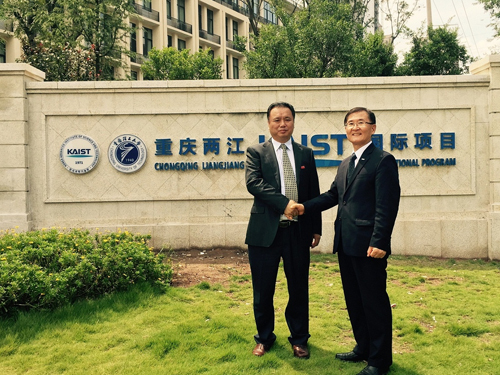 KAIST and Chongqing University of Technology in China Open an International Program
With the help of KAIST, Chongqing University of Technology (CQUT) in China established an electrical engineering and computer science program and admitted their first 66 freshmen this fall semester.
The joint program was created to foster skilled engineers in the fields of electrical engineering and computer science, which are necessary for the development of the Korean and Chinese Industrial Complex located in Chongqing City.
KAIST has provided CQUT with a majority of the program’s curricula currently offered to its students in Daejeon, Korea.
Under the jointly administered program, KAIST takes on education and research while CQUT is responsible for student selection and administration.
KAIST has dispatched eight professors to teach the related fields in English, and 17 CQUT professors will teach the rest of the curricula.
In August 2014, KAIST and CQUT singed a cooperation agreement for education and research exchange and created the CQUT-KAIST Education Cooperation Center, which is headed by Professor Young-Nam Han of the Electrical Engineering Department at KAIST.
The two universities will expand their collaboration to include graduate programs by 2016.
In the picture below, President Steve Kang of KAIST (right) shakes hands with President Shi Xiaohui of Chongqing University of Technology (left).
2015.09.17 View 10909
KAIST and Chongqing University of Technology in China Open an International Program
With the help of KAIST, Chongqing University of Technology (CQUT) in China established an electrical engineering and computer science program and admitted their first 66 freshmen this fall semester.
The joint program was created to foster skilled engineers in the fields of electrical engineering and computer science, which are necessary for the development of the Korean and Chinese Industrial Complex located in Chongqing City.
KAIST has provided CQUT with a majority of the program’s curricula currently offered to its students in Daejeon, Korea.
Under the jointly administered program, KAIST takes on education and research while CQUT is responsible for student selection and administration.
KAIST has dispatched eight professors to teach the related fields in English, and 17 CQUT professors will teach the rest of the curricula.
In August 2014, KAIST and CQUT singed a cooperation agreement for education and research exchange and created the CQUT-KAIST Education Cooperation Center, which is headed by Professor Young-Nam Han of the Electrical Engineering Department at KAIST.
The two universities will expand their collaboration to include graduate programs by 2016.
In the picture below, President Steve Kang of KAIST (right) shakes hands with President Shi Xiaohui of Chongqing University of Technology (left).
2015.09.17 View 10909 -
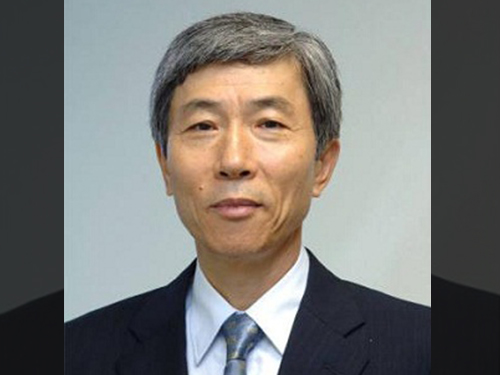 Professor Seok-Jung Kang Is Appointed the Director of the Korea Institute of Ceramic Engineering and Technology
Professor Seok-Jung Kang of the Material Sciences and Engineering Department at KAIST has been appointed to the position of the third Director of the Korea Institute of Ceramic Engineering and Technology. His three-year term will begin September 9, 2015.
An authority in the field of ceramics, Professor Kang has taught at KAIST since 1980. He received his bachelor’s degree from the Department of Metallurgical Engineering at Seoul National University, his master’s degree at KAIST, and his doctoral degree at the Ecole Centrale de Paris.
Professor Kang received the Robert B. Sosman Award in 2011, an annual prize given by the American Society of Ceramics to recognize outstanding achievement in basic science in an area that results in significant impact to the field of ceramics. He was the first Asian recipient of the award.
He also received the 2015 Professor Sir Richard Brooke Award, a prestigious bi-annual prize presented to an outstanding scholar by the European Society of Ceramics.
2015.09.15 View 6812
Professor Seok-Jung Kang Is Appointed the Director of the Korea Institute of Ceramic Engineering and Technology
Professor Seok-Jung Kang of the Material Sciences and Engineering Department at KAIST has been appointed to the position of the third Director of the Korea Institute of Ceramic Engineering and Technology. His three-year term will begin September 9, 2015.
An authority in the field of ceramics, Professor Kang has taught at KAIST since 1980. He received his bachelor’s degree from the Department of Metallurgical Engineering at Seoul National University, his master’s degree at KAIST, and his doctoral degree at the Ecole Centrale de Paris.
Professor Kang received the Robert B. Sosman Award in 2011, an annual prize given by the American Society of Ceramics to recognize outstanding achievement in basic science in an area that results in significant impact to the field of ceramics. He was the first Asian recipient of the award.
He also received the 2015 Professor Sir Richard Brooke Award, a prestigious bi-annual prize presented to an outstanding scholar by the European Society of Ceramics.
2015.09.15 View 6812 -
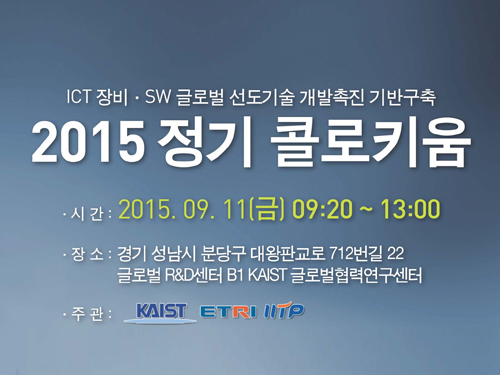 KAIST to Hold a Colloquium on the Internet of Things and Open Stack
With the support of the Ministry of Science, ICT, and Future Planning of Korea, KAIST hosted a colloquium on the Internet of Things (IoT) and Open Stack at the KAIST Research Center for Global Cooperation located in Pangyo. The upcoming event was organized to provide an overview of the technological trends to IT companies and foster their success in the global market.
The colloquium invited numerous field-experts as speakers and discussed the influence of IoT and OpenStack on the small- and medium-sized companies in Korea.
Professor Gwan-Hoo Lee from the American University joined as a speaker and shared his insights of how IoT would change the global business environment. He introduced various business models developed by Microsoft, Intel, Apple, Google, and Cisco and discussed how Korean companies could utilize the existing tools and strategy to succeed in the global market. His talk focused specifically on the importance of overseas partnerships and technology stack analysis.
President Hyun-Jung Jang from the Korean OpenStack Community also gave a speech on global partnership through OpenStack. He discussed the future trends of OpenStack and why companies should invest in the field.
KAIST used the event as an opportunity to provide information to domestic companies that are interested in building partnerships with overseas companies and in developing new IoT and OpenStack technology.
More information about the event can be provided online at www.ictc.or.kr.
2015.09.11 View 5537
KAIST to Hold a Colloquium on the Internet of Things and Open Stack
With the support of the Ministry of Science, ICT, and Future Planning of Korea, KAIST hosted a colloquium on the Internet of Things (IoT) and Open Stack at the KAIST Research Center for Global Cooperation located in Pangyo. The upcoming event was organized to provide an overview of the technological trends to IT companies and foster their success in the global market.
The colloquium invited numerous field-experts as speakers and discussed the influence of IoT and OpenStack on the small- and medium-sized companies in Korea.
Professor Gwan-Hoo Lee from the American University joined as a speaker and shared his insights of how IoT would change the global business environment. He introduced various business models developed by Microsoft, Intel, Apple, Google, and Cisco and discussed how Korean companies could utilize the existing tools and strategy to succeed in the global market. His talk focused specifically on the importance of overseas partnerships and technology stack analysis.
President Hyun-Jung Jang from the Korean OpenStack Community also gave a speech on global partnership through OpenStack. He discussed the future trends of OpenStack and why companies should invest in the field.
KAIST used the event as an opportunity to provide information to domestic companies that are interested in building partnerships with overseas companies and in developing new IoT and OpenStack technology.
More information about the event can be provided online at www.ictc.or.kr.
2015.09.11 View 5537 -
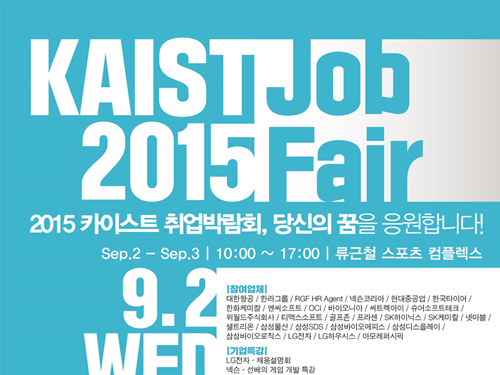 KAIST's Student Job Fair 2015
KAIST’s Undergraduate Student Council and Graduate Student Council jointly hosted the 2015 KAIST Job Fair on September 2-3, 2015 at the Sports Complex on campus.
The Job Fair took place for the sixth time this year. Forty-three companies, including some of the largest ones in Korea such as Samsung, Hyundai, LG, SK Construction, Hankook Tires, as well as those owned by KAIST graduates, have participated.
The Job Fair specialized in three fields: information technology (IT) and electronic and mechanical engineering. The event included one-to-one employment counseling between human resources managers and students, mock interviews, employment orientations, job consulting, interview makeup lessons, resume writing and photo-shooting, etc.
The international students who attended the event received information packages on employment from the participating companies.
This event was open not only to KAIST students but also to students from other universities in the local community, offering more job opportunities to a wider range of people.
Last year alone, a total of 1,200 people including KAIST students and graduates joined the KAIST’s Job Fair.
2015.09.04 View 6626
KAIST's Student Job Fair 2015
KAIST’s Undergraduate Student Council and Graduate Student Council jointly hosted the 2015 KAIST Job Fair on September 2-3, 2015 at the Sports Complex on campus.
The Job Fair took place for the sixth time this year. Forty-three companies, including some of the largest ones in Korea such as Samsung, Hyundai, LG, SK Construction, Hankook Tires, as well as those owned by KAIST graduates, have participated.
The Job Fair specialized in three fields: information technology (IT) and electronic and mechanical engineering. The event included one-to-one employment counseling between human resources managers and students, mock interviews, employment orientations, job consulting, interview makeup lessons, resume writing and photo-shooting, etc.
The international students who attended the event received information packages on employment from the participating companies.
This event was open not only to KAIST students but also to students from other universities in the local community, offering more job opportunities to a wider range of people.
Last year alone, a total of 1,200 people including KAIST students and graduates joined the KAIST’s Job Fair.
2015.09.04 View 6626 -
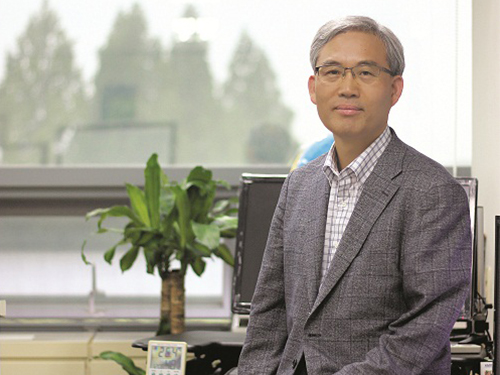 KAIST's Research Team Receives the Best Paper Award from the IEEE Transaction on Power Electronics
A research team led by Professor Chun T. Rim of the Department of Nuclear and Quantum Engineering at the Korea Advanced Institute of Science and Technology (KAIST) has received the First Prize Papers Award from the IEEE (Institute of Electrical and Electronics Engineers) Transactions on Power Electronics (TPEL), a peer-reviewed journal that covers fundamental technologies used in the control and conversion of electric power.
A total of three research papers received this award in 2015.
Each year, TPEL’s editors select three best papers among those published in the journal during the preceding calendar year. In 2014, the TPEL published 579 papers. Professor Rim’s paper was picked out as one of the three papers published last year for the First Prize Papers Award.
Entitled “Generalized Active EMF (electromagnetic field) Cancel Methods for Wireless Electric Vehicles (http://ieeexplore.ieee.org/xpls/abs_all.jsp?arnumber=6684288&tag=1),” the paper proposed, for the first time in the world, three generalized design methods for cancelling the total EMF generated from wireless electric vehicles. This technology, researchers said, can be applied to any wireless power transfer systems.
The award ceremony will be held at the upcoming conference of the 2015 IEEE Energy Conversion Congress and Expo in September in Montreal, Canada.
2015.08.27 View 10924
KAIST's Research Team Receives the Best Paper Award from the IEEE Transaction on Power Electronics
A research team led by Professor Chun T. Rim of the Department of Nuclear and Quantum Engineering at the Korea Advanced Institute of Science and Technology (KAIST) has received the First Prize Papers Award from the IEEE (Institute of Electrical and Electronics Engineers) Transactions on Power Electronics (TPEL), a peer-reviewed journal that covers fundamental technologies used in the control and conversion of electric power.
A total of three research papers received this award in 2015.
Each year, TPEL’s editors select three best papers among those published in the journal during the preceding calendar year. In 2014, the TPEL published 579 papers. Professor Rim’s paper was picked out as one of the three papers published last year for the First Prize Papers Award.
Entitled “Generalized Active EMF (electromagnetic field) Cancel Methods for Wireless Electric Vehicles (http://ieeexplore.ieee.org/xpls/abs_all.jsp?arnumber=6684288&tag=1),” the paper proposed, for the first time in the world, three generalized design methods for cancelling the total EMF generated from wireless electric vehicles. This technology, researchers said, can be applied to any wireless power transfer systems.
The award ceremony will be held at the upcoming conference of the 2015 IEEE Energy Conversion Congress and Expo in September in Montreal, Canada.
2015.08.27 View 10924 -
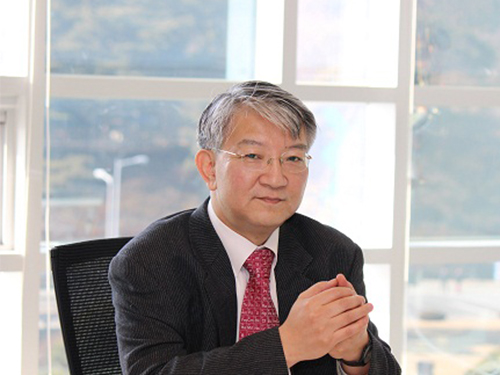 Nature Biotechnology Nominates Sang Yup Lee of KAIST for Top 20 Translational Researchers of 2014
Nature Biotechnology, recognized as the most prestigious journal in the field of biotechnology, has released today its list of the Top 20 Translational Researchers of 2014. Distinguished Professor Sang Yup Lee of the Department of Chemical and Biomolecular Engineering at KAIST (Korea Advanced Institute of Science and Technology) ranked seventh in the list. He is the only Asian researcher listed.
The journal, in partnership with IP Checkups, a patent analytics firm, presents an annual ranking of researchers based on their paper and patent output. The list includes, among others, each researcher’s most-cited patent in the past five years and their H index, a measurement to evaluate the impact of a researcher’s published work utilizing citation analysis. (More details can be found at http://www.nature.com/bioent/2015/150801/full/bioe.2015.9.html.)
American institutions made up the majority of the list, with 18 universities and research institutes, and the remainder was filled by KAIST in Korea and the Commonwealth Scientific and Industrial Research Organization (CSIRO) in Australia.
Globally known as a leading researcher in systems metabolic engineering, Professor Lee has published more than 500 journal papers and 580 patents. He has received many awards, including the Citation Classic Award, Elmer Gaden Award, Merck Metabolic Engineering Award, ACS Marvin Johnson Award, SIMB Charles Thom Award, POSCO TJ Park Prize, Amgen Biochemical Engineering Award, and the Ho Am Prize in Engineering.
2015.08.27 View 10809
Nature Biotechnology Nominates Sang Yup Lee of KAIST for Top 20 Translational Researchers of 2014
Nature Biotechnology, recognized as the most prestigious journal in the field of biotechnology, has released today its list of the Top 20 Translational Researchers of 2014. Distinguished Professor Sang Yup Lee of the Department of Chemical and Biomolecular Engineering at KAIST (Korea Advanced Institute of Science and Technology) ranked seventh in the list. He is the only Asian researcher listed.
The journal, in partnership with IP Checkups, a patent analytics firm, presents an annual ranking of researchers based on their paper and patent output. The list includes, among others, each researcher’s most-cited patent in the past five years and their H index, a measurement to evaluate the impact of a researcher’s published work utilizing citation analysis. (More details can be found at http://www.nature.com/bioent/2015/150801/full/bioe.2015.9.html.)
American institutions made up the majority of the list, with 18 universities and research institutes, and the remainder was filled by KAIST in Korea and the Commonwealth Scientific and Industrial Research Organization (CSIRO) in Australia.
Globally known as a leading researcher in systems metabolic engineering, Professor Lee has published more than 500 journal papers and 580 patents. He has received many awards, including the Citation Classic Award, Elmer Gaden Award, Merck Metabolic Engineering Award, ACS Marvin Johnson Award, SIMB Charles Thom Award, POSCO TJ Park Prize, Amgen Biochemical Engineering Award, and the Ho Am Prize in Engineering.
2015.08.27 View 10809